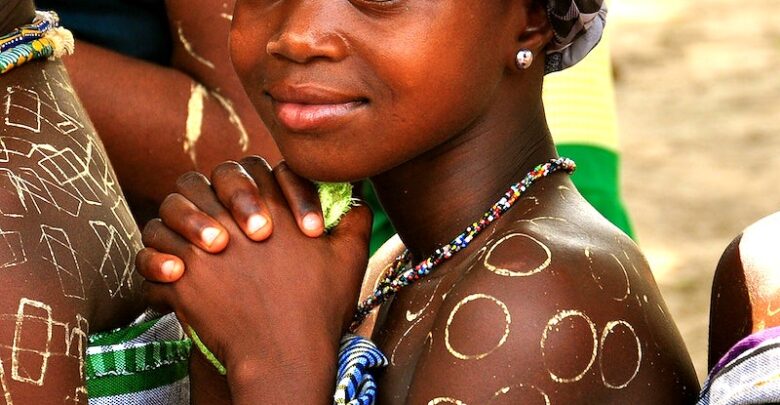The Ga People of Ghana: The Ga Religion and Tribes (Ewe, Ashanti Akwapim, Fanti, Kwahu, Akim)

The Ga people of the Ga-Dagbe group of Kwa people occupy the Greater Accra locale of present-day Ghana. The Kwa nation of Africa includes the Ga-Dagbe, Ewe, Akwapim, Fanti, Kwahu, Akim, and Ashanti.
As indicated by certain legends Ga people relocated from Nigeria, others said they were part of Israel that moved toward the south through present-day Uganda, then along the CongoRiver, toward the west through Cameroons,
Nigeria, Benin, Togo lastly Greater Accra.
Considering that Africans have roamed Africa for millennia, the origin of any tribe in Africa might be exceptionally unsure.
Any African could have somewhat originated from any place in Africa.
For instance, the Wolof name for a King is Fari which is basically the same as the word Faro of old Egypt and may highlight the Egyptian legacy of the Wolof in West Africa.
The Egyptian word for the most noteworthy god and righteous father was Ra and the Setswana word for father is additionally Ra.
Also Read: African Hairstyles’ Social Importance and Spiritual Significance
It is subsequently not unexpected that among the Ga people, those at Teshi claim to have moved from a town called Boma on the shores of the Congo River.
Those at Labadi from Bonny Island off the bank of Nigeria, and those from Gamashi from Benin City in Eastern Nigeria.
While these legends from remembered history cannot be proved, they cannot be denied as well.
There are a few names in Uganda among the Acholi which are basically the same as Ga names.
There is also a supposed language in the Cameroons called Ge which is like the Ga language.
To complicate matters, the old unleavened bread of the Ga people called akpiti1 is similar to the unleavened bread of the Jews.
What can be said with certainty is that the Ga people were not static, but unique, and took part in the extremely normal peculiarity of movement in Africa.
The Ga Religion
The Ga have faith in the presence of spirits, some of which can be good and others bad.
They believe in the presence of a supreme spirit that made the world and this incomparable being has both male and female properties.
The name of this maker god is Ataa-Naa Nyonmo that in a real sense signifies “the god who is both”.
“Ataa” signifies “male” and “Naa” signifies “female”, while “Nyonmo” signifies “divine nature”; however the maker god is likewise called “Ofe” or the “very first” or Maawu.
The great god and maker Maawu has his foe in a divine being called Abomsam, who is the head of evil spirits.
Maawu works with minor divinities, coordinated in a hierarchical order on two levels.
The most significant level is involved by the DzemaWodzi, on the lower level we find the Wodzi.
Among the DzemaWodzi are the divine force of the sky, the earth, the seas, the stars, the gods of the lagoon, the god of war, and various different gods.
The contrast between the two levels is that while Wodzi can be loved by people, DzemaWodzi must be worshipped by the people.
The divine beings might possess a few people by transforming them into mediums or Wulomoi, or priests, and Woyei, or priestesses, through whom they speak with humans.
DzemaWodzi and Wodzi are dedicated offers of blood from cows, sheep, goats or hens.
While to honor Maawu it is important to forfeit more significant drinks, however never human blood because for the Ga people murder is a sacred taboo.
Believes
The Ga religion and people believe that every single natural human body and living creatures have spiritual components and death does not destroy the spirits of living beings.
Who generally stay in communication with the bodies after they die.
The Ga religion accepts that the human body contains three elements, the Gbomotso, the body, Susuma, the spirit of the man related to dreams, and Kla, the supporting spirit of life.
Every individual born on the same day has the same Kla and the same Kla name, or the name of the day.
At the point when Susuma wanders in dreams, the Kla stays in the body, to keep the man alive; if both Kla and Susuma leave the body together permanently, the individual dies.
When humans die, their Susumas live to become ancestral spirits always willing to help the descendants of the dead, while the Kla can reincarnate.
There is likewise an origination of the trinity that is totally not quite the same as the Christian origination of the trinity.
The sky, Nwei, is viewed as a male, and the earth, Shikpong is viewed as female; Nsho, the ocean, is brought into the world from the marriage among Nwei and Shikpong.
This trinity of Nwei, Shikpong and Nsho upholds life; Shikpong’s holy day is Thursday when agriculture is forbidden, while the holy day of the Nsho is Tuesday, the day when fishing is prohibited.
The Ga religion also has a system of taboos that guides and regulates their behavior.
All demonstrations of incest, homosexuality, rape, murder, disregard for the elderly, and other shameless motions are viewed as taboos deserving of an outcast from society, with weighty fines and even death on account of the murder.
Also Read: How The Story, Birth of Jesus And The Bible Was Copied From Ancient Egypt Spirituality
Homowo Festival
Homowo derives from two Ga words homo meaning hunger and wo meaning to hoot at. It therefore mean hooting at hunger.
During the process of migration, the Ga nation experienced famine and severe hunger.
However, they mustered up the courage to till the land, planted corn and called upon Ataa-Naa Nyonmo and the ancestral spirits through libation to bless the farms to yield in abundance.
In response to their prayers deluge of rains, followed, the crops grew and yielded in abundance.
Being experts in fishing they also caught fish in abundance.
They celebrated this abundance of food and victory over hunger with specially prepared traditional food from unfermented corn powder called kpokpoe which has now been corrupted to kpekple, and palm nut soup of fish.
They hooted at and ridiculed hunger as they ate the kpokpoe with the palm nut soup prepared from fish only, poured libation and offered some of the food symbolically to the ancestral spirits.
Homowo is celebrated annually to commemorate that day when hunger was defeated, hooted at, and ridiculed.





